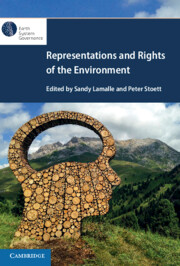Book contents
- Representations and Rights of the Environment
- Series page
- Representations and Rights of the Environment
- Copyright page
- Dedication
- Epigraph
- Contents
- Illustrations
- Tables
- Contributors
- Preface
- Acknowledgements
- 1 An Introduction
- Part I Challenges
- Part II Recollection
- Part III Perspectives
- 10 Rights of Nature, a New Perspective in Law
- 11 Property for Nature
- 12 Reimagining the Common Law
- 13 Democratic Representation, Environmental Justice and Future People
- 14 The Normative and Social Dimensions of the Transition towards a Responsible, Circular Bio-Based Economy
- 15 New Perspectives on Guardianship of Nature
- Index
- References
11 - Property for Nature
from Part III - Perspectives
Published online by Cambridge University Press: 16 March 2023
- Representations and Rights of the Environment
- Series page
- Representations and Rights of the Environment
- Copyright page
- Dedication
- Epigraph
- Contents
- Illustrations
- Tables
- Contributors
- Preface
- Acknowledgements
- 1 An Introduction
- Part I Challenges
- Part II Recollection
- Part III Perspectives
- 10 Rights of Nature, a New Perspective in Law
- 11 Property for Nature
- 12 Reimagining the Common Law
- 13 Democratic Representation, Environmental Justice and Future People
- 14 The Normative and Social Dimensions of the Transition towards a Responsible, Circular Bio-Based Economy
- 15 New Perspectives on Guardianship of Nature
- Index
- References
Summary
Property law is increasingly confronted with limits and modifications arising from environmental and social contexts. The objective of this chapter is to highlight how property law can provide answers to environmental challenges, by adapting several of its fundamental concepts to the polymorphism of environmental and social issues. Starting with a study of the theoretical movement of Earth jurisprudence, the chapter suggests that it is possible to consider Nature as a subject of legal interests, allowing it to acquire legal standing. It also suggests that it is necessary to reconceptualise property and its narrative to develop, in both civil and common law, a more limited, relational and functional conception of property. In addition, the polymorphic heritage of property law makes it possible to call upon the civilian concept of patrimony, in its symbolic or technical function, to protect the environment.
Keywords
- Type
- Chapter
- Information
- Representations and Rights of the Environment , pp. 259 - 286Publisher: Cambridge University PressPrint publication year: 2023

